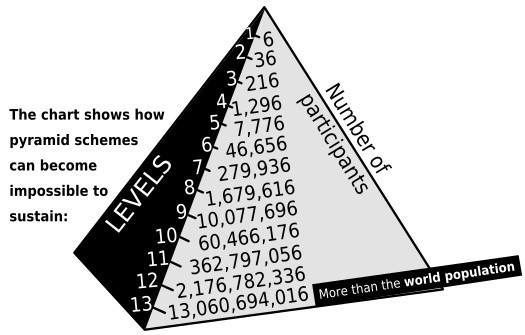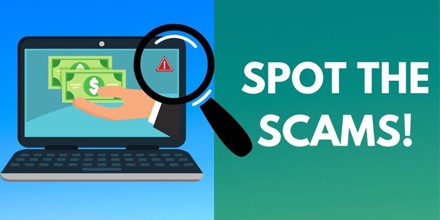If, like me, you want to change your life and achieve financial freedom, it’s very likely you’ve already seen a number of scams, either online via websites or in social media. Or even amongst your circle of friends and family.
It’s easy to be drawn in but the cost is always financial loss and usually also lost friends and self-respect
Be sure though that there are numerous people out there preying remorselessly on people just like you and me, who just want a way to make honest money and change our lives. And these scumbags are getting more sophisticated in their approach each year, dressing their scams up as great “business opportunities”.
So it’s really important to know how to spot a scam and know when to leave well alone.
I’m not going to talk about telephone, email or online fraud like phishing – I’ll assume you know not to give out bank, credit card, password or personal details without verifying who it is that wants them.
But what I’ll look at here are the type of schemes that blur the line between legit money-making methods and scams designed to make you poor and them rich.
The Red Alerts
Red Alert No 1 – Rags to Riches:
Ever seen those posts on social media or websites “How I made $10,000 in my second month”, or “How I Went from Rags to Riches in 3 months”? Usually accompanied by a picture of a perfect toothed beaming guy or girl standing next to a Ferrari or beach-front villa.
It rarely happens that fast, unless you start with a substantial amount of money. And if you’re looking to spend a substantial amount, be doubly aware!
Legitimate long term businesses either on or off-line take a combination of time, work and money. Yes it is possible to build a business, especially on-line, with very little cash outlay, but that means it will take more time.
As an example – if you had $5000 to spend on starting a business it’s quite possible to set up say an Amazon business and make $10,000 profit in 3 months, if you get the right product, sell it fast and re-invest the profits. But only if you do it very well from day one. (See my article on Amazon FBA).
But if you don’t have a lot of money, or any, to invest then it’s going to be a time and work investment that gets you there, such as learning how to become an affiliate marketer or copywriter or acquiring any other skill that can earn you money in the long-term.
Red Alert No 2 – Cheesy Video:
But delve a little deeper and open the link and you’ll find an invitation to watch a free video. Same guy or girl talking at length about themselves without giving out any information, promising to tell you how they do it, but only if you watch to the end.
Then the next big chunk of the video is loads of “real life people” who changed their lives in 3 months by following the Guru.
Often you can’t fast-forward the video and there’s an annoying digital countdown at the bottom. And then there’s a stack of talk about “Value” and “Bonuses if you sign up now” (hence the countdown).
Now these videos aren’t necessarily a red-light in themselves. Unfortunately it’s become the number one way the on-line world builds excitement and a “call to buy”, even for perfectly legit opportunities. But it’s definitely an amber alert in my opinion. And it turns red if you’re asked to pay to get more information without knowing the ins and outs of what’s on offer.
These videos often have a limited time “bonus” or “discount”. Guess what – that discount is always there. If you have to “buy now” to get it then your scam alert should be on red!
Red Alert No 3 – The Buy-In:
Any legit business opportunity, either on or off-line should set out clearly how it works and the costs. If it’s selling a product or service then you need to know what it is and be able to look at it before you part with any cash.
If the offer is vague about this or asks you for payment details to get to the next stage – put your credit card away. Close it down and either Google “Is XYZ Legit”, then ignore the first few (paid adverts) search results and go through the honest reviews.
Or better still – let me know what you’re looking at and I’ll check it out and give you my honest opinion.
Red Alert No 4 – Big Price-Tag:
Obviously, if they’re talking about a “sure-fire” investment opportunity either real estate, crypto currency, trading or whatever then you need to do a mass of due-dilligence before you part with any cash.
But what I’m really talking about here is “guaranteed pathways to riches” that will be revealed to you if you invest a substantial amount of money in “bettering yourself”. What constitutes substantial is up to you. But if it’s more than say $500 (in my opinion) then you should be on alert – especially if you can’t see what’s inside.
Of course there are exceptions to this, some training courses are in-depth and might qualify you at a high level to start a new career. But if it’s more than this amount there should be an installment plan and some kind of opt-out or cash-back.
In other articles on Amazon FBA, and Affiliate Marketing I’ve reviewed some great business/training platforms that cost less than $50 a month and represent amazing value. I’m a member of one of these myself and will probably join the other in the next couple of months.
The moral is – if you can’t go away and check it out before parting with cash then it’s probably a scam.
Network Marketing or MLM – Is Network Marketing a Scam?
Now this is a bit controversial, but probably the number one scam out there is the Network Marketing or Multi Level Marketing (MLM) scheme. They’re one and the same thing, but let’s call them MLM for the sake of simplicity.
We’ve all had that conversation with a friend, colleague or family member who’s just got involved in a “fantastic business opportunity”, then tries to sell you a vacuum cleaner, water filter, perfume that is either massively over-priced or just plain crap! And then they try to persuade you to do it too.
I remember a guy I worked with in the 80’s doing it with after-shave lotion. It was a cheap copy of famous high-end brands. And it smelled okay for the first 10 minutes, but after that it smelt like diesel oil!
There are literally thousands of them ranging from nutrition supplements to household goods to self-improvement courses, all of which are of course perfectly legit products or services in their own right. But it’s the way the product is marketed that makes it a scam.
These schemes resemble “Pyramid Schemes” in almost every way. Most countries have made pyramid schemes illegal, but MLM is still legal as long as it meets certain criteria.
What is MLM?
The essence of an MLM scheme is that a product or service is marketed via different levels of recruiter.
They resemble a pyramid structure where the people at the top – let’s call them the “founders” recruit people below them to (a) sell their product and (b) recruit more people to sell their product who then recruit more people to sell the product, and so it goes on.

This might look like a legitimate business model at first sight, and the founders of these schemes will often point out that in any company the CEO sits at the top and recruits people below to sell the product.
But the big difference with MLM is that at each stage of the, let’s say pyramid, the recruiters earn commission from the people below. And almost always, the people below have to buy a certain amount of the product in order to join the scheme.
The difference in a legitimate business is that the company pays the sales people to sell their product and makes profit on it, without the sales person having to buy the product themselves.
In an MLM the people above are all taking a slice of commission from the product that the people below have to buy. And if they don’t sell it and/or recruit more people below them who buy the product, they end up holding inventory and out-of-pocket.
The main test of legitimacy (barely) of an MLM is that the salespeople can make commission by selling the product they buy and not just from recruiting more people. In an illegal pyramid scheme the commissions are all generated by the initial investment made by the people below and not by sales of product. It’s a very fine line.
And the fact is that, because there are so many layers of people taking commission from the product or service it absolutely has to be massively overpriced for what it is – which makes it virtually impossible to sell. So the only way to then make money is to recruit more victims.
The maths on this are staggering. If we assume that each layer of people recruits 6 people each, who then each recruit a further 6 each and so on, then in 12 layers there are more people recruited than the entire population of the Earth.
But of course it gets more difficult for each layer, so they end up recruiting 1 or 2 or none. Result – they’re out-of-pocket and out of friends!

So what happens in reality is that the lower levels simply walk away and the recruiters keep recruiting more people who also end up walking away after buying product they can’t sell.
How to Spot an MLM
It’s not always obvious. The founders of these schemes have become very clever at labeling them as anything other than MLM. The term “Network Marketing” was invented to hide the fact that it’s MLM and a lot still call themselves Network Marketing companies.
The term “Direct Sales” is often used. But a true direct sales company is perfectly legit as long as there are only say 2 or 3 fixed layers of people maximum and the product or service is fairly priced.
The first clue is that there will be a lot of bluster about motivation, entrepreneurship, team-building, life-changing income. But not a lot about the end customer or the product value.
The second clue – and I came across this only this week when someone on a Facebook group told me they were recruiting people to sell a health and well-being product, is that they often approach you on the basis of recruiting direct sales agents.
I asked for more information, partly out of curiosity and partly because I’m always open to legitimate opportunities for myself and my readers. And what followed was a telephone “interview”:
“Are you motivated and willing to invest time in your future? Yes – Great you’re just what we’re looking for”.
Then a series of 4 videos like the ones I described earlier. They didn’t even mention the name of the company until I opened the video. I recognised the company. Prosperity of Life, straight away and closed it down.
“Not All MLM’s are A Scam”
Really? This is why I said it was controversial, because I beg to differ with this view. The fact is that there are some massive companies running the MLM model very successfully for the founders. I won’t mention them here because it’s not fair to label something a scam without providing evidence for that view. But I will be doing that in separate articles.
But many of them have been around for so long and generate such big profits at the company level that they rarely get attacked in law or closed down.
These companies usually survive by recruiting huge numbers of lower level people and replacing them as they fall away. And they draw a very fine line between their products being saleable and generating commission for the high level recruiters.
You’ll often find the products on eBay or Amazon as the victims off-load them at massive discounts to what they paid.
Scam Alerts
We’re all in this together and unfortunately the scammers will always find new ways to attract your money. But I hope this has given you some insights into how to spot either out-and-out scams or schemes that don’t give value for money.
I’ll be writing articles on scams I find so if you want to be kept up to date, click “follow” and you’ll get an email alert when I publish future articles.
And if you find anything out there that looks dodgy then let me know in the comments box and I’ll investigate and report back.
Stay safe and get wealthy …….The right way!


